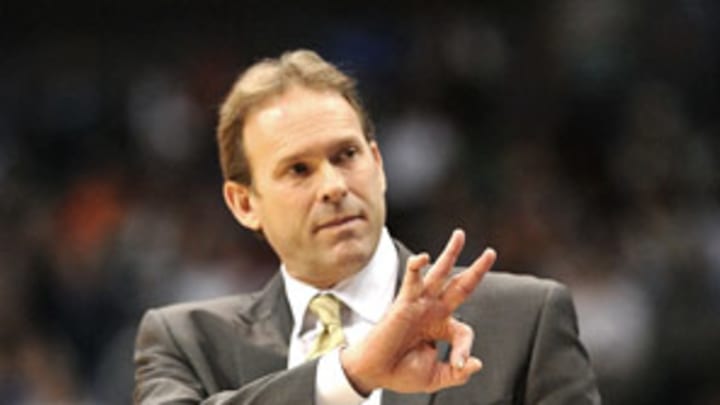After being fired as coach, Rambis embraces role as television analyst

MANHATTAN BEACH, Calif. -- Kurt Rambis has hands like an old defensive lineman. Which is to say, his long fingers jet out at odd and awkward and, well, disgusting angles. A pointer goes that way. A thumb curves left. A middle finger looks OK upon first glance, though under closer inspection, it reminds one of a cracked pencil.
Once, during his heyday with the Los Angeles Lakers in the mid-1980s, Rambis actually glanced down at his right hand in horror as a piece of bone pierced through the skin. "I'm not saying I'm a beautiful man," Rambis says. "But my fingers are pretty ugly."
As he speaks, the greatest long-haired, horn-rimmed-glasses-wearing, Santa Clara-bred hippie power forward in NBA history laughs. He is sitting at a Greek restaurant on a recent afternoon, nibbling on a piece of pita bread, explaining how wonderful -- absolutely, positively wonderful -- life is.
With one problem: the hands.
"Honestly," he says, "sometimes I wonder what to do with them."
Here, Rambis isn't speaking rebounding or blocking shots, shooting or passing. No, as a first-year NBA studio analyst for ESPN, he is referring to the quandary that many in his position face.
"At first, I would be sitting at a table, and in that position you don't really have to worry about hands," he says. "But then they started having me stand up, and it was ... weird. Do you fold your arms? Do you hold a pen? Do you rub your chin? What in the world does a person do with his hands when he's talking basketball?"
The ensuing silence offers the answer. Namely, there is none. Yet even with this slight physical dilemma, Rambis has quickly emerged as one of the best athlete-turned-commentators in years. Having endured the likes of Emmitt Smith, Craig James, Shaun King and Jerry Rice, sports fans often wonder what, exactly, ex-jocks add to the genre. Generally speaking, their "expert" opinion includes clichés akin to "He's simply a winner" and "This is where the champions step up." Rambis, however, seems to genuinely understand what he can offer. He is fantastic at breaking down plays and rarely resorts to the basic, meaningless go-to words that melt the minds of viewers.
"You have no idea how hard Kurt works at this," says his wife, Linda. "Whatever he takes on, you know he gives everything to the task."
Though he is in the familiar position of fired coach-turned-TV guy, little about Rambis feels, well, familiar. In person, he is honest and true, an excellent listener who refuses -- even off the record -- to slam the Minnesota Timberwolves (and, particularly, David Kahn, their dreadful president of basketball operations), the team that fired him last July.
In two years as the team's coach, Rambis compiled a 32-132 mark -- "terrible," he acknowledges, without adding that: 1. Kahn was a meddlesome pain in the rear; 2. Shoot-first point guard Jonny Flynn was playing on one leg; 3. It sure would have been nice to have had Ricky Rubio. When asked if, in any way, it's a relief not to be coaching, Rambis turns serious. "No," he says. "Because while I really enjoy TV and embrace the challenge, my true joy probably comes in helping players learn and succeed. I miss that. I really do."
Rambis travels to ESPN's Bristol, Conn., headquarters every two weeks or so, where he watches highlights and critiques games from the comfort of a warm room. He says it's been fulfilling to see the Timberwolves' improvement ("I like to think I helped some of the guys," he says), and fascinating to watch Jeremy Lin's odd journey. "The great part of my job is that I'm invested without being invested," he says. "I go home at night and I'm not emotionally drained."
And yet ... Rambis says, "I miss being emotionally drained."
